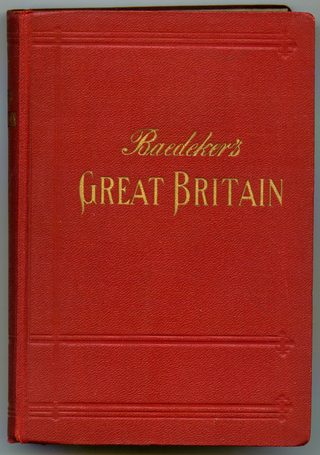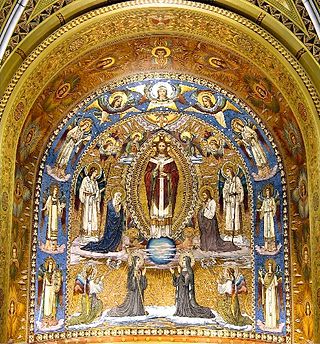
Regensburg is a city in eastern Bavaria, at the confluence of the Danube, Naab and Regen rivers, Danube's northernmost point. It is the capital of the Upper Palatinate subregion of the state. With more than 150,000 inhabitants, Regensburg is the fourth-largest city in the State of Bavaria after Munich, Nuremberg and Augsburg and the 8th largest of all cities on the Danube river. From its foundation as an imperial Roman river fort, the city has been the political, economic and cultural centre of the surrounding region. Later, under the rule of the Holy Roman Empire, it housed the Perpetual Diet of Regensburg.

Verlag Karl Baedeker, founded by Karl Baedeker on 1 July 1827, is a German publisher and pioneer in the business of worldwide travel guides. The guides, often referred to simply as "Baedekers", contain, among other things, maps and introductions; information about routes and travel facilities; and descriptions of noteworthy buildings, sights, attractions and museums, written by specialists.

The King of Bavaria was a title held by the hereditary Wittelsbach rulers of Bavaria in the state known as the Kingdom of Bavaria from 1805 until 1918, when the kingdom was abolished. It was the second time Bavaria was a kingdom, almost a thousand years after the short-lived Carolingian kingdom of Bavaria.

Carl Ludwig Koch was a German entomologist and arachnologist. He was responsible for classifying a great number of spiders, including the Brazilian whiteknee tarantula and common house spider. He was born in Kusel, Germany, and died in Nuremberg, Germany.

Maria Theresa Henriette Dorothea of Austria-Este was the last Queen of Bavaria. She was the only child of Archduke Ferdinand Karl Viktor of Austria-Este and Archduchess Elisabeth Franziska of Austria.
The Cecilian Movement for church music reform began in Germany in the second half of the 1800s as a reaction to the liberalization of the Enlightenment.

Albert Maria Joseph Maximilian Lamoral, 8th Prince of Thurn and Taxis was the eighth Prince of Thurn and Taxis and Head of the Princely House of Thurn and Taxis from 2 June 1885 until his death on 22 January 1952.

Hugo Maximilian Philippus Ludwig Franziskus Graf von und zu Lerchenfeld auf Köfering und Schönberg, known as Graf von Lerchenfeld-Köfering and as Lerchenfeld for short, was a Bavarian conservative politician and the prime minister of Bavaria from 1921 to 1922. He belonged to the Bavarian People's Party, a conservative, strongly federalist party in Bavaria, formed after the First World War.

Hugo Phillip Graf von Lerchenfeld auf Köfering und Schönberg was the representative of the Kingdom of Bavaria in Berlin from 1880 to 1918.

Duchess Therese Mathilde Amalie of Mecklenburg-Strelitz was a member of the House of Mecklenburg-Strelitz and a Duchess of Mecklenburg. Through her marriage to Karl Alexander, 5th Prince of Thurn and Taxis, Therese was also a member of the House of Thurn and Taxis.

The history of the Jews in Regensburg, Germany reaches back over 1,000 years. The Jews of Regensburg are part of Bavarian Jewry; Regensburg was the capital of the Upper Palatinate and formerly a free city of the German empire. The great age of the Jewish community in this city is indicated by the tradition that a Jewish colony existed there before the common era; it is undoubtedly the oldest Jewish settlement in Bavaria of which any records exist.
Franz Lehrndorfer was a German organist, composer, and pedagogue.
Christian Schaller is a German Roman Catholic theologian from Munich. In June 2013, he was co-recipient, with Richard A. Burridge, of the Ratzinger Prize.

Händlmaier's is a condiment brand manufactured by Luise Händlmaier Senffabrikation GmbH & Co. KG, based in Regensburg, Germany. They are primarily known for their sweet Bavarian mustard.
Franz Xaver von Schönwerth was a Bavarian civil servant who was an important collector of folklore in the Upper Palatinate region.
Fürstlich Sächsischer Hofbuchdruckerei of Altenburg, Germany, is used generically in this article to denote a succession of book printers based in Altenburg, in the German state of Thuringia, that — under various capacities, names, and owners – have endured as one continuous printing operation, without interruption, for four hundred and thirty years — since 1594, the early modern German period. The bookbinding aspect of the business included a bindery.

Max Schmalzl was a German Redemptorist lay brother who worked as a painter, illustrator, and designer in the style of the Nazarene and the Beuron schools. His intricate woodcuts and illustrations are ubiquitous in Catholic missals and devotional volumes from the late 1800s and early 1900s.
Johann Friedrich Steinkopf was a German bookseller and publisher.
Johann Esaias von Seidel was a printer, publisher and publicist in the 19th century who promoted the reforms of Maximilian von Montgelas. He also promoted ecumenism, the concept of unity among different Christian denominations.

Lena ChristGerman:[lɛnakrɪst] was a German writer.













